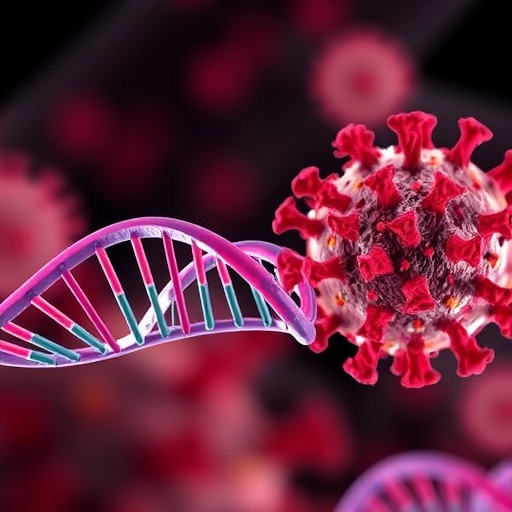In a landmark discovery that could alter the course of cancer treatment, researchers at The University of Texas MD Anderson Cancer Center have unveiled compelling evidence that mRNA-based COVID-19 vaccines significantly enhance the effectiveness of immune checkpoint inhibitors in cancer therapy. This breakthrough, announced during the 2025 European Society for Medical Oncology (ESMO) Congress, demonstrates that cancer patients receiving mRNA COVID vaccines within 100 days of commencing immunotherapy were twice as likely to achieve survival at the three-year mark compared to their unvaccinated counterparts.
This finding stems from a comprehensive study involving over 1,000 patients treated between August 2019 and August 2023, encompassing diverse cancer types. The study’s retrospective design evaluated clinical outcomes associated with receiving mRNA vaccines such as those deployed against SARS-CoV-2, elucidating the vaccines’ unexpected yet profound immunomodulatory effects beyond infectious disease prevention. Notably, the result challenges long-standing paradigms by positioning conventional prophylactic vaccines as potential adjuvants that recalibrate anti-tumor immunity.
At the molecular level, the research team uncovered that mRNA vaccines serve as potent immune stimulators, functioning analogously to an alarm system that heightens immune surveillance and response. The vaccination process activates innate immune signaling pathways and primes adaptive T cell responses, thereby enhancing the immune milieu at tumor sites. Intriguingly, the immune activation triggered by these vaccines induces the upregulation of programmed death-ligand 1 (PD-L1) on tumor cells, a known immunosuppressive checkpoint molecule that tumors exploit to evade cytotoxic T lymphocytes.
This PD-L1 elevation, while a defensive mechanism by tumors, paradoxically generates a therapeutic window of opportunity which immune checkpoint inhibitors—specifically anti-PD-1/PD-L1 antibodies—can exploit. By blocking PD-L1-mediated inhibitory signaling, these checkpoint blockade agents unleash a robust anti-cancer immune assault, effectively dismantling tumor immune evasion. The enhanced PD-L1 expression post-mRNA vaccination thus synergizes with checkpoint inhibitors to amplify therapeutic efficacy.
Preclinical investigations reinforced these clinical insights, revealing that in murine models, administration of mRNA vaccines potentiated immune activation characterized by increased infiltration of effector T cells and cytokine production within tumor microenvironments. Parallel human studies recapitulated this immune paradigm, confirming elevated immune markers and PD-L1 expression in patients’ tumors following vaccination. These data collectively bolster the mechanistic rationale for combining mRNA vaccines with immunotherapy.
Among patient cohorts, the therapeutic benefit was strikingly pronounced in immunologically “cold” tumors—tumors with inherently low baseline PD-L1 expression and poor response to immunotherapy alone. For these traditionally refractory tumors, receipt of the mRNA COVID vaccine conferred nearly a five-fold boost in three-year overall survival, heralding a potential breakthrough for patients with limited therapeutic options. This observation is poised to reshape treatment protocols by broadening the applicability and responsiveness of checkpoint blockade therapy.
The study’s lead investigators, Dr. Steven Lin and Dr. Adam Grippin, emphasize the translational significance of these findings. They postulate that the ubiquity, cost-effectiveness, and established safety profile of COVID mRNA vaccines render them compelling candidates as standard adjuncts in cancer immunotherapy regimens. This paradigm shift could democratize access to cutting-edge immune therapies, elevating care quality globally and transcending socioeconomic barriers.
Further underscoring the validity of the results, survival improvements persisted irrespective of the vaccine manufacturer, dosage frequency, or treatment chronology at MD Anderson. This robustness implies a broad-spectrum immunostimulatory property inherent to mRNA vaccine technology rather than an artifact of specific formulations. Consequently, ongoing efforts are directed toward organizing a randomized, multi-center Phase III clinical trial to rigorously validate these observations and institutionalize mRNA vaccination as part of routine cancer therapy.
The resultant synergy between mRNA vaccines and immune checkpoint blockade promises to revolutionize the oncology landscape by transforming immunologically inert tumors into susceptible targets, potentially heightening cure rates and extending patient lifespans. Moreover, the mechanistic insights gleaned from this research open avenues for innovative vaccine designs tailored explicitly for cancer immunomodulation, transcending traditional infectious disease frameworks.
Remarkably, the foundation for this discovery originated from graduate work exploring personalized mRNA cancer vaccines against brain tumors, conducted by Dr. Grippin under Dr. Elias Sayour. The unexpected immunogenicity of mRNA technology in eliciting anti-cancer responses sparked the broader hypothesis that COVID mRNA vaccines might exhibit similar immune-potentiating effects, an idea now substantiated clinically.
This paradigm-advancing study was supported by a constellation of prestigious institutions and foundations, including the National Institutes of Health, National Cancer Institute, and various cancer-focused philanthropic organizations. Their collective contributions facilitated the robust analysis and dissemination of findings that promise to catalyze a new epoch in oncology treatment.
As the oncology community anticipates the outcomes of forthcoming trials, these insights invigorate hope for integrating readily available vaccines with immune therapies to surmount current challenges in cancer treatment. The strategic repurposing of mRNA vaccines epitomizes the fusion of infectious disease science and oncology, underscoring the transformative potential of immunological innovation.
In summary, the identification of SARS-CoV-2 mRNA vaccines as powerful modulators of tumor immunity redefines the therapeutic landscape, offering a scalable and effective method to augment immune checkpoint blockade. This novel intersection of vaccinology and cancer therapy embodies a remarkable leap forward, fostering optimism that more patients will achieve durable remissions and improved quality of life worldwide.
Subject of Research: People
Article Title: SARS-CoV-2 mRNA vaccines sensitize tumours to immune checkpoint blockade
News Publication Date: 22-Oct-2025
Web References:
References:
Lin, S., Grippin, A., et al. SARS-CoV-2 mRNA vaccines sensitize tumours to immune checkpoint blockade. Nature, 22 October 2025.
Image Credits: The University of Texas MD Anderson Cancer Center
Keywords: mRNA vaccines, Cancer research




